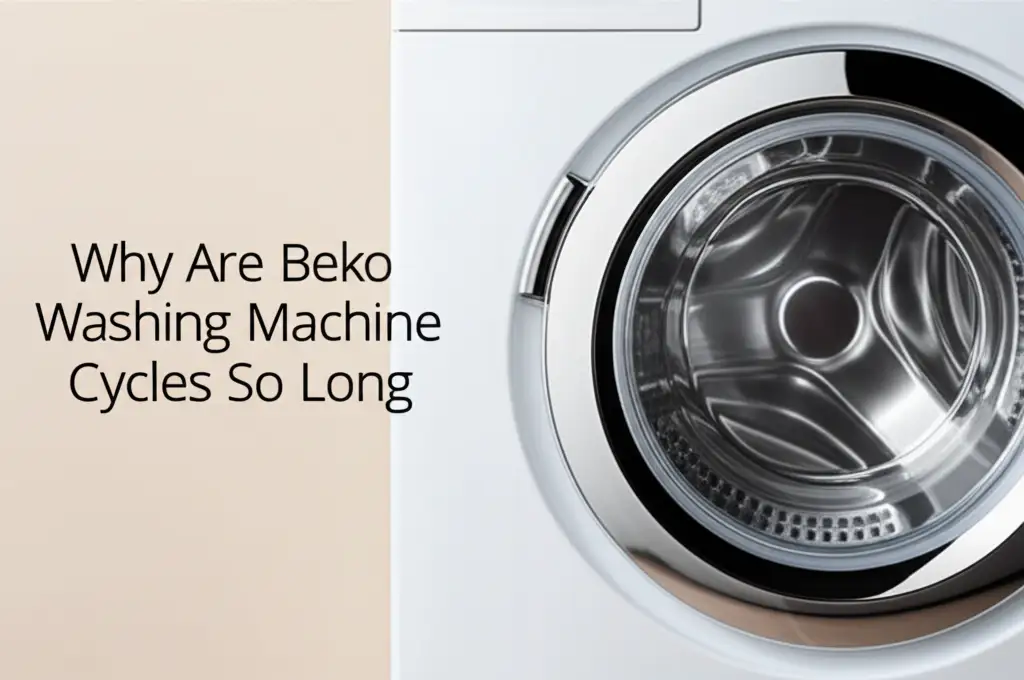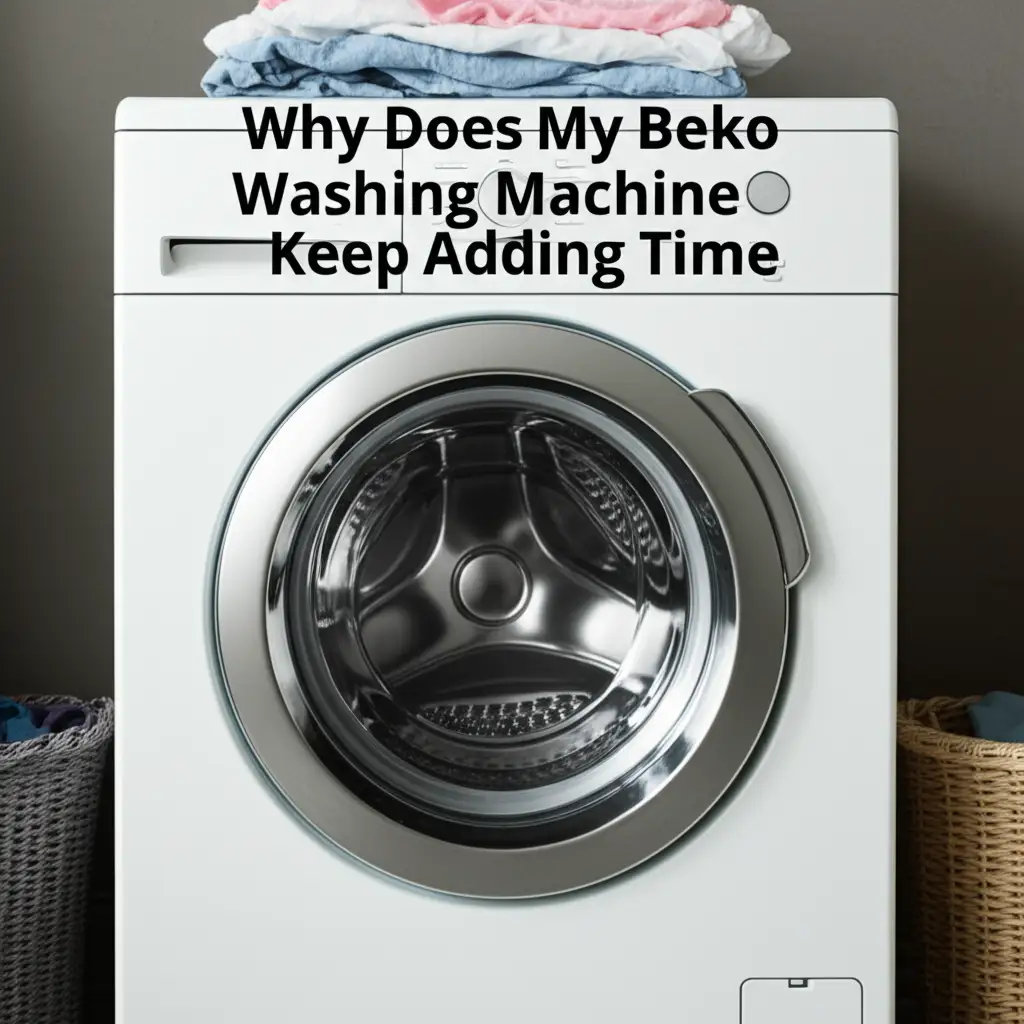· Todd Martin · Home Appliances · 17 min read
Why Are Beko Washing Machine Cycles So Long

Understanding Why Beko Washing Machine Cycles Take So Long
You just bought a new Beko washing machine. You are excited to get your laundry done. Then, you see the cycle time. It says two hours, or even three. Many people wonder why Beko washing machine cycles are so long. This is a common question. I understand your frustration. You want clean clothes, but you also want to save time. This article explains the reasons behind the extended wash times. We will discuss modern appliance design. We will also cover how to make the most of your Beko machine. You will learn about energy efficiency. You will also find ways to shorten wash times when possible. Get ready to understand your washing machine better.
Takeaway
- Modern Beko washing machine cycles are long due to energy efficiency and better cleaning.
- They use less water and lower temperatures over a longer period.
- Sensor technology adjusts cycles based on load size and dirt levels.
- You can choose quick wash options for less soiled items.
- Proper loading and maintenance help prevent unexpected delays.
Why Beko Washing Machine Cycles Are Long: A Concise Answer
Beko washing machine cycles are often long because they are designed for maximum energy and water efficiency, combined with superior cleaning performance. Modern machines use less water and lower temperatures. This requires more time for detergents to work and for clothes to tumble and clean effectively. Sensor technology also adjusts the cycle duration for optimal results.
The Core Reason for Extended Beko Washing Machine Cycles
Many people ask why Beko washing machine cycles are so long. The primary reason is efficiency. Modern washing machines, including Beko models, prioritize energy and water savings. Older machines used a lot of water and high temperatures. They finished cycles quickly. New machines operate differently. They use less water and lower heat. This means they need more time to achieve the same or better cleaning results. The longer duration allows the detergent to dissolve fully. It also gives the clothes more time to soak. This gentle, longer process cleans clothes thoroughly. It also protects fabrics.
Energy Efficiency Goals
Beko, like many appliance manufacturers, aims for high energy efficiency. They design their machines to use less electricity. This helps the environment. It also saves you money on utility bills. A key way to achieve this is by using lower wash temperatures. Heating water consumes a lot of energy. Running a cycle for a longer time with cooler water uses less energy overall. The machine still gets clothes clean. It just does so with a more gradual approach. This method is gentle on your clothes. It ensures they last longer.
Water Conservation Methods
Another main goal is water conservation. Water is a precious resource. Modern Beko machines use significantly less water than older models. They do not just fill the drum with water. Instead, they use a series of short rinses and sprays. This “spray and tumble” action uses minimal water. It still ensures the detergent reaches all parts of the fabric. Less water means less energy is needed to heat it. It also means less wastewater. This approach requires more time for the clothes to be properly saturated and rinsed. It is a trade-off for environmental benefits and lower bills.
Improved Cleaning Performance
Despite lower temperatures and less water, modern Beko machines offer improved cleaning. The longer cycle time plays a crucial role here. It allows more time for the detergent to activate. It gives stains more time to loosen. Clothes tumble longer, ensuring better friction and cleaning. This thorough cleaning often means you do not need harsh chemicals or very hot water. Your clothes come out cleaner. They also look better for longer. This extended process ensures deep penetration of water and detergent. This removes dirt and grime effectively.
Modern Washing Machine Technology and Cycle Length
Modern Beko washing machines are packed with smart technology. These features often contribute to longer cycle times. They are not random delays. These technologies work to optimize every wash. They ensure your clothes get the best care. They also help save resources. Understanding these systems can help you appreciate your Beko machine’s design. It makes sense why Beko washing machine cycles are so long when you consider these advancements. They make the machine more efficient and effective.
Smart Sensor Systems
Beko machines use advanced sensor systems. These sensors detect several things. They check the load size. They measure the dirt level in the water. Some even sense the fabric type. Based on this information, the machine adjusts the cycle. It determines the optimal amount of water. It sets the right temperature. It also decides the exact wash time. If sensors detect a very dirty or large load, the cycle will naturally extend. This ensures thorough cleaning. This adaptive technology means cycles are not fixed. They are tailored to each wash. This customization can sometimes lead to longer times. Why is my Beko washing machine taking so long? provides more details on specific reasons for unexpected delays.
Variable Spin Speeds
Beko washing machines feature variable spin speeds. The machine determines the best spin speed for the load. It does this to extract as much water as possible. This reduces drying time. High spin speeds take time to build up. The machine needs to balance the load properly before spinning at maximum speed. If the load is unbalanced, the machine will slow down. It might redistribute the clothes. This rebalancing adds time to the cycle. It prevents damage to the machine. It ensures clothes come out less wet.
Advanced Detergent Dissolution
Newer detergents are highly concentrated. Modern machines are designed to work with these detergents. They need more time to dissolve them fully. The machine might pause or use gentle tumbling. This allows the detergent to penetrate fabrics. This prevents residue on clothes. It also ensures efficient cleaning. This careful process can add minutes to the overall cycle. It ensures your clothes are thoroughly cleaned. It helps avoid re-washing due to poor detergent distribution.
Understanding Beko’s Specific Wash Programs
Beko washing machines offer a wide range of wash programs. Each program is designed for specific fabric types and soil levels. The length of a cycle depends heavily on the program you select. Some programs are inherently longer than others. This is by design. They offer different levels of cleaning intensity. Understanding these programs helps you choose wisely. It also explains why Beko washing machine cycles are so long for certain settings. It helps you manage your laundry time better.
Eco Programs Explained
Eco programs are a prime example of longer cycle times. These programs are designed for maximum energy efficiency. They use lower water temperatures. They extend the wash duration significantly. The longer soak and tumble time with cooler water break down dirt effectively. This saves a lot of electricity. While an Eco program might run for three hours, it uses less energy than a shorter, hotter wash. This is great for your utility bills and the planet. Many people choose Eco programs for everyday laundry.
Intensive Cycles for Heavy Loads
Beko machines also have intensive cycles. These are for heavily soiled items or tough fabrics. Think work clothes or muddy sports gear. Intensive cycles often involve pre-wash phases. They use higher wash temperatures. They also have extended agitation and rinse times. These cycles are designed to remove stubborn dirt. They naturally take longer to complete. If you are washing very dirty items, expect a longer cycle. It ensures the best cleaning results.
The Role of Pre-Wash and Extra Rinse Options
Many Beko programs offer optional settings. These include pre-wash or extra rinse cycles. Selecting these options will add time to the main wash cycle. A pre-wash soaks and tumbles clothes before the main wash. This helps loosen heavy dirt. An extra rinse ensures all detergent is removed. This is useful for people with sensitive skin. Each of these additions extends the overall duration. They improve cleaning or rinsing. Always check your selected options. They directly affect the cycle length. If you need a faster wash, you can learn how to put Beko washing machine on quick wash.
Factors That Can Unintentionally Lengthen Your Beko Wash
Sometimes, Beko washing machine cycles become long unexpectedly. This is not always due to the machine’s design. It can be due to how you use it. Certain habits or external factors can cause delays. Understanding these can help you prevent surprisingly long wash times. It helps you keep your laundry routine efficient. These issues are often easy to fix.
Overloading the Drum
Overloading is a common cause of extended cycles. Filling the drum too much affects how clothes move. Water and detergent cannot circulate properly. The machine senses this. It tries to correct it. It might add more water. It might extend the wash time. This ensures proper saturation and cleaning. An overloaded machine also struggles to spin efficiently. It will make multiple attempts to balance the load for spinning. Each attempt adds time. This can significantly prolong the cycle. Always leave some space in the drum. A good rule is to leave a hand’s width between the clothes and the top of the drum.
Water Pressure and Temperature Issues
Your home’s water supply affects the washing machine. Low water pressure can make filling the machine take longer. If the hot water supply is not consistent, the machine might need more time to heat water. It could even pause the cycle until the right temperature is reached. Cold water supply issues can also cause delays. Ensure your water valves are fully open. Check your home’s water pressure. These external factors can trick your Beko machine into taking more time than usual.
Imbalanced Loads and Excessive Suds
An imbalanced load occurs when clothes clump together. This usually happens during the spin cycle. The machine detects the imbalance. It then tries to redistribute the laundry. It will stop, add a little water, and tumble. It repeats this until the load is balanced enough to spin. This process adds significant time. It can happen multiple times. Excessive suds can also cause delays. Too much detergent creates too many bubbles. The machine detects this. It will add extra rinse cycles. This ensures all suds are removed. Using the correct amount of detergent prevents this issue.
Machine Malfunctions and Error Codes
Sometimes, a Beko washing machine cycle is long due to a fault. An internal malfunction can cause the machine to pause. It might get stuck on a certain phase. Error codes often appear on the display in such cases. Common issues include drainage problems or sensor faults. If your machine repeatedly adds time or never finishes, it might indicate a problem. Consult your machine’s manual for error code meanings. Sometimes, a simple reset helps. Other times, a repair is needed. Why does my Beko washing machine keep adding time? offers more insights into this specific issue.
How Beko Cycles Compare to Other Brands
You might think only Beko washing machine cycles are so long. This is not true. The trend of longer wash cycles is industry-wide. Most modern washing machine brands follow this design philosophy. They all aim for similar goals: energy efficiency and water conservation. This means if you switch to another brand, you will likely find similar cycle durations. It is part of the evolution of home appliances. Understanding this helps set realistic expectations.
Industry Trends in Cycle Length
The appliance industry has shifted. Manufacturers prioritize environmental impact and running costs. This means lower temperatures and less water. These factors naturally extend wash times. It is a direct result of stricter energy efficiency standards globally. Consumers also demand machines that save money on utilities. This means that a standard cotton cycle on a Bosch, LG, or Samsung machine will often be comparable in length to a Beko. The core technology and design principles are similar across brands. You are not alone in observing these longer cycles. Why are Miele washing machine cycles so long? provides a comparative perspective on another popular brand with extended cycle times.
Benefits of Longer Cycles Across Brands
The benefits of longer cycles apply to all brands. They are not specific to Beko. Longer cycles mean better cleaning at lower temperatures. This is gentler on your clothes. Your fabrics last longer. Colors stay vibrant. They also save energy. This reduces your carbon footprint. You save money on electricity and water bills. The quiet operation of many modern machines is also a benefit. They tumble gently for extended periods. This avoids harsh, noisy agitations. So, while you wait longer, you get cleaner clothes, save money, and help the environment. It is a win-win situation in the long run.
Optimizing Your Beko Washing Machine for Shorter Cycles
While Beko washing machine cycles are so long for good reasons, you can still optimize your laundry routine. There are ways to get your clothes clean faster. You do not always need the longest cycle. Understanding your machine’s settings is key. You can make smart choices. This helps you manage your time effectively. You can still get clean clothes without waiting hours.
Choosing the Right Program
Beko washing machines have various programs. Some are specifically designed for speed. Look for “Quick Wash,” “Daily Quick,” or “Express” cycles. These cycles are much shorter. They are ideal for lightly soiled clothes. They are also good for items you just want to refresh. Understand their limitations. They may not clean heavily soiled items as effectively. They might use more water or energy per wash than an Eco cycle. But for everyday needs, they are perfect. Always read your machine’s manual. It will detail the purpose and duration of each program. How to put Beko washing machine on quick wash provides specific instructions for your Beko machine.
Proper Load Management
Do not overload your washing machine. This is crucial for efficient and quick cycles. An overloaded machine struggles to clean. It also struggles to spin. This leads to longer cycle times. It also puts strain on the machine. Fill the drum with enough space for clothes to tumble freely. A good rule is to leave a hand’s width between the top of the clothes and the drum. For small loads, select a “Half Load” option if available. This adjusts water and time for smaller washes. It makes the cycle more efficient.
Regular Maintenance Checks
Regular maintenance keeps your machine running smoothly. This prevents unexpected delays. Clean the detergent drawer regularly. Remove any buildup. Check the drain filter frequently. Lint and debris can clog it. A clogged filter slows down draining. This can extend rinse and spin cycles. Run a drum clean cycle once a month. This prevents mold and detergent buildup inside the drum. A clean machine works more efficiently. It helps maintain optimal cycle times. How to use Beko washing machine for the first time offers essential setup and usage tips. You can also learn how to put Beko washing machine on drum clean for optimal machine health.
Troubleshooting Common Issues Extending Beko Cycle Times
Sometimes, a Beko washing machine cycle is longer than expected. It might even seem stuck. This can be frustrating. Understanding common issues helps you troubleshoot. You can often resolve these problems yourself. This prevents unnecessary service calls. It also gets your laundry done faster. Knowing what to look for makes you a smarter appliance owner.
When the Cycle Won’t End
If your Beko washing machine cycle seems to go on forever, check a few things. First, ensure the water supply is on and has good pressure. The machine needs water to progress. Second, look for excessive suds. Too much detergent causes the machine to add extra rinses. This significantly lengthens the cycle. Third, check for an unbalanced load. The machine tries repeatedly to redistribute clothes before spinning. This adds many minutes. Reduce detergent. Rearrange clothes if needed. Sometimes, a simple power cycle (unplug for a minute, then plug back in) can reset the machine.
Addressing Drainage and Spin Problems
Poor drainage or spinning issues will extend a cycle. The machine cannot move to the next phase if water is still in the drum. If clothes are too wet, the machine will try to spin again. Check the drain filter. It might be clogged with lint or small objects. Inspect the drain hose for kinks or blockages. Ensure the household drain where the hose connects is not blocked. If the machine detects an imbalance, it will attempt to redistribute the load. This prevents violent vibrations during the spin. This process can add several minutes to the cycle. Why is my Beko washing machine not spinning or draining? provides in-depth solutions for these common problems.
What to Do About Error Codes
Beko washing machines display error codes when there is a problem. These codes are important clues. They tell you exactly what is wrong. Refer to your user manual to understand what each code means. Common error codes relate to water supply, drainage, or motor issues. Addressing the specific error helps resolve the cycle length problem. Some errors are simple fixes, like clearing a blocked filter. Others may require professional help. Always consult the manual first. It is your best guide for troubleshooting.
Frequently Asked Questions
Is it normal for Beko washing machine cycles to be so long?
Yes, it is normal for modern Beko washing machine cycles to be long. This design prioritizes energy and water efficiency. Machines use less water and lower temperatures over a longer period. This ensures thorough cleaning and saves on utility bills. It is an industry-wide trend, not specific to Beko.
Can I shorten a Beko washing machine cycle?
Yes, you can shorten a Beko washing machine cycle. Beko machines offer “Quick Wash,” “Daily Quick,” or “Express” programs. These are ideal for lightly soiled clothes or refreshing items. However, these shorter cycles may use more water or energy per wash than the longer, efficient cycles. Choose wisely based on your needs.
Does a longer wash cycle mean better cleaning?
Generally, yes, a longer wash cycle means better cleaning. The extended time allows detergent to fully dissolve and penetrate fabrics. Clothes tumble more, leading to better stain removal at lower temperatures. This gentle yet thorough process protects fabrics and ensures cleaner results without harsh conditions.
Why does my Beko machine add time mid-cycle?
Your Beko machine might add time mid-cycle for several reasons. Common causes include an unbalanced load, which the machine tries to fix by redistributing clothes. Excessive suds from too much detergent can trigger extra rinse cycles. Low water pressure or temperature issues can also cause delays while the machine waits for optimal conditions.
When should I call a technician for long cycles?
You should call a technician if your Beko washing machine cycle is unusually long and not completing. This is especially true if you see error codes that you cannot resolve using the manual. Persistent drainage issues, constant re-balancing, or the machine getting stuck mid-cycle indicate a potential malfunction that requires professional diagnosis and repair.
Do Beko washing machines use more electricity for longer cycles?
No, Beko washing machines generally do not use more electricity for longer cycles. In fact, longer cycles, especially “Eco” programs, are designed to use less electricity overall. They achieve this by using lower water temperatures, which is the biggest energy consumer. The extended time compensates for the lower heat, leading to energy savings.
Conclusion
Understanding why Beko washing machine cycles are so long helps you appreciate modern appliance design. It is not a flaw. It is a feature. These machines prioritize energy efficiency, water conservation, and superior cleaning performance. They achieve this by using less water and lower temperatures over extended periods. Smart sensor technology also plays a big role. It adapts cycles to your specific laundry needs.
While standard cycles are long, Beko offers faster options for your convenience. You can choose quick wash programs for lighter loads. Proper loading and regular maintenance also help prevent unexpected delays. Embrace the longer cycles for their benefits. They save money on your utility bills. They are also better for the environment. Most importantly, they get your clothes truly clean. If you have any further questions or encounter persistent issues, refer to your Beko manual or contact customer support for specific advice. Make the most of your Beko washing machine.
- Beko washing machine
- long cycles
- washing machine problems
- energy efficiency
- laundry tips





